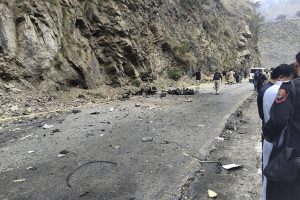A suicide bomber in northwest Pakistan rammed his explosive-laden car into a vehicle Tuesday, killing five Chinese nationals and their Pakistani driver, police and government officials said.
The attack happened in Shangla, a district in Khyber Pakhtunkhwa Province, local police chief Bakhat Zahir said. He added that the five killed were construction workers and engineers heading to the Dasu Dam, the biggest hydropower project in Pakistan, where they worked.
Khyber Pakhtunkhwa borders Afghanistan; the Pakistani Taliban have stepped up attacks there in recent years.
Authorities said the bodies were transported to a nearby hospital, and that security forces started a massive search in the area to look for accomplices. Police also launched an investigation into the attack.
Tuesday’s attack came less than a week after Pakistani security forces killed eight Balochistan Liberation Army (BLA) militants who opened fire on a convoy carrying Chinese citizens outside the Chinese-funded Gwadar port in the volatile southwestern Balochistan province. The BLA wants independence from the central government in Islamabad.
Pakistan’s Interior Minister Mohsin Naqvi condemned the attack in a statement on Tuesday and offered condolences to the families of the deceased. He wrote: “The enemy has targeted Chinese citizens who are the friends of Pakistan,” without elaborating on who he was referring to. He also vowed to us “an iron hand” to deal with those responsible, and expressed hope the attack wouldn’t negatively impact China-Pakistan relations.
Naqvi also visited China’s embassy in the capital, Islamabad, where he briefed the Chinese ambassador, Jiang Zaidong, about the attack, promising a full investigation, according to the Ministry of Interior.
In a statement, the Chinese Embassy in Pakistan said it “strongly condemn[ed] this terrorist attack, express[ed] deep condolences to the victims and sincere sympathy to the bereaved families, and [is] making every effort to handle the aftermath together with the Pakistani side.”
The statement added that the embassy had “launched an emergency plan immediately, requesting the Pakistani side to thoroughly investigate the attack and severely punish the perpetrators.”
Thousands of Chinese nationals work in Shangla on projects relating to the China-Pakistan Economic Corridor (CPEC), which includes a multitude of mega projects such as road construction, power plants and agriculture.
CPEC is a lifeline for Pakistan’s cash-strapped government, currently facing one of the worst economic crises. It is part of China’s Belt and Road Initiative, a global endeavor aimed at reconstituting the Silk Road and linking China to all corners of Asia.
Chinese laborers working on CPEC-related projects in Pakistan have come under attack in recent years.
In July 2021, at least 13 people, including nine Chinese nationals, were killed when a suicide bomber detonated his vehicle near a bus carrying several Chinese and Pakistani engineers and laborers, prompting the Chinese companies to suspend work at the time.
Since then, Pakistan has beefed up security on CPEC-related projects.

































